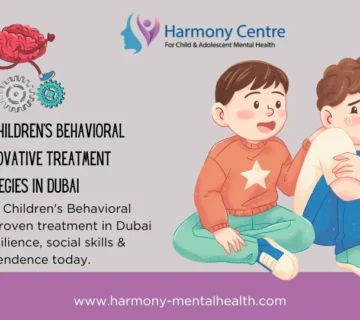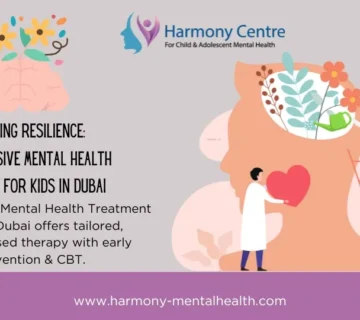Art Therapy Child Mental Health Dubai: A Creative Path to Healing at Harmony Centre
Discover art therapy for child mental health in Dubai at Harmony Centre. Our creative, evidence‑based approach helps children express emotions and heal through art.
Contact Information
| Contact Method | Details |
|---|---|
| Phone | +971 (52) 8773268 / 04 558 2015 |
| Click Here | |
| info@harmony-mentalhealth.com | |
| Address | Office 409, Building Alrazi-64C, 26th St, Healthcare City, Dubai |
Introduction
In the vibrant city of Dubai, where academic pressures and rapid urban growth often challenge children’s emotional well‑being, innovative therapies are essential. At Harmony Centre Mental Health Dubai, we believe in the transformative power of art therapy. By integrating creativity into mental health care, art therapy provides children with a unique, non‑verbal avenue to express feelings, process experiences, and foster healing. Our evidence‑based approach combines the therapeutic benefits of creative expression with personalized care to nurture resilience and promote overall well‑being.
Learn More About Harmony Centre • Contact Us
Understanding Art Therapy
What Is Art Therapy?
Art therapy is a form of psychotherapy that uses the creative process of making art to improve a person’s physical, mental, and emotional well‑being. It enables children to explore emotions, resolve conflicts, and reduce stress without needing to rely solely on verbal communication.
Key Components
- Creative Expression:
Through drawing, painting, sculpting, and other art forms, children can express complex emotions that may be difficult to articulate verbally. - Emotional Exploration:
Art provides a safe space for children to explore and understand their emotions, paving the way for insight and healing. - Non‑Verbal Communication:
For children who struggle with verbal expression, art offers an alternative medium to communicate their inner world. - Therapeutic Relationship:
Art therapy sessions are guided by trained therapists who help interpret the creative process and facilitate meaningful discussions.
The Role of Art Therapy in Child Mental Health
Art therapy can play a pivotal role in addressing various mental health issues, including anxiety, depression, trauma, and behavioral challenges. It encourages self‑awareness and self‑expression while reducing stress and fostering problem‑solving skills.
The Benefits of Art Therapy for Children
Enhancing Emotional Expression
Art therapy allows children to externalize feelings that they may not be able to describe with words. By putting their emotions onto paper or another medium, they gain a clearer understanding of their internal experiences.
- Emotional Clarity:
Art helps children visualize and comprehend complex emotions, leading to better emotional regulation. - Stress Relief:
The act of creating art can be soothing and serve as a healthy outlet for pent‑up emotions.
Improving Communication Skills
For children with speech or language difficulties, art therapy can bridge the gap between internal feelings and external communication.
- Non‑Verbal Expression:
Children learn to communicate through images and symbols, which can complement traditional speech therapy. - Building Confidence:
As children successfully express themselves through art, they gain confidence in their ability to share thoughts and feelings.
Promoting Self‑Awareness and Self‑Esteem
Art therapy encourages children to reflect on their creations, which can enhance self‑awareness and contribute to a positive self‑image.
- Positive Reinforcement:
Therapists celebrate artistic achievements, reinforcing the child’s strengths and fostering self‑esteem. - Identity Formation:
Creating art allows children to explore their personal identity in a supportive environment, contributing to overall emotional growth.
Facilitating Trauma Processing
For children who have experienced trauma, art therapy offers a gentle way to process and heal from distressing experiences.
- Safe Exploration:
Art provides a non‑threatening medium for children to explore traumatic memories and emotions. - Gradual Desensitization:
Through creative expression, children can gradually confront and process painful experiences at their own pace.
Supporting Social Development
Group art therapy sessions encourage children to interact with peers, fostering social skills and empathy.
- Peer Connection:
Collaborative projects help children learn teamwork, sharing, and constructive feedback. - Enhanced Empathy:
Discussing art in a group setting allows children to understand different perspectives and build social bonds.
How Harmony Centre Integrates Art Therapy into Child Mental Health Care
Comprehensive Assessment and Personalized Planning
Initial Consultation and Evaluation
At Harmony Centre, our journey with art therapy begins with a comprehensive assessment. We collaborate with parents, educators, and our multidisciplinary team to understand your child’s unique needs.
- Standardized Assessments:
We use evidence‑based tools to evaluate cognitive, emotional, and behavioral functioning. - Direct Observations:
Our therapists observe your child during creative activities to gain insights into their emotional state and expression. - Parental and Educator Input:
Detailed feedback from those closest to the child helps us create a holistic view of their strengths and challenges.
This thorough assessment forms the basis for a personalized art therapy plan tailored to support your child’s mental health.
Personalized Art Therapy Programs
Individual Sessions
One‑on‑one art therapy sessions provide a safe, private space for children to express their emotions.
- Customized Techniques:
Our therapists select art activities based on your child’s interests and therapeutic needs. - Focused Interventions:
Sessions may involve drawing, painting, or sculpting to help children process specific emotional challenges.
Group Sessions
Group art therapy offers the added benefit of peer support and social interaction.
- Collaborative Projects:
Group projects foster teamwork and encourage children to share their perspectives. - Social Skill Development:
Discussing art in a group setting enhances communication skills and builds empathy.
Family Art Therapy
Involving the entire family in art therapy can improve communication and strengthen bonds.
- Shared Creative Activities:
Family sessions may involve collaborative art projects that promote dialogue and mutual understanding. - Building a Supportive Home Environment:
These sessions help families learn how to reinforce therapeutic strategies in daily life, creating a consistent, nurturing atmosphere.
Learn More About Our Art Therapy Services
Contact Harmony Centre
Evidence‑Based Outcomes of Art Therapy
Quantitative Improvements
Our art therapy programs have yielded measurable benefits:
- Symptom Reduction:
Studies show that children participating in art therapy exhibit a significant reduction in anxiety, depression, and behavioral challenges. - Enhanced Academic Focus:
Improved emotional regulation from art therapy correlates with better concentration and academic performance. - Increased Social Engagement:
Participation in group sessions boosts social skills, leading to stronger peer relationships and improved communication.
Qualitative Success
Beyond measurable outcomes, art therapy has transformed lives:
- Increased Self‑Expression:
Children learn to articulate emotions through creative processes, resulting in greater self‑awareness and confidence. - Emotional Healing:
Parents report that their children show improved mood and resilience after engaging in art therapy sessions. - Holistic Growth:
Art therapy fosters an integrated development approach, benefiting not only mental health but also academic and social domains.
“Art therapy at Harmony Centre has unlocked a new world for my daughter. She now expresses herself more freely and is better able to manage her emotions.”
– Parent Testimonial
“The group art therapy sessions helped my son build confidence and connect with peers. It’s been a transformative experience.”
– Parent Testimonial
For further reading on the scientific basis of art therapy, please refer to the American Art Therapy Association (external link).
Practical Strategies for Parents and Educators
For Families
Create a Conducive Creative Environment
- Designate a Creative Space:
Set aside a quiet, well‑lit area in your home for art activities. Ensure it is stocked with various art supplies like paper, paints, and markers. - Establish a Routine:
Incorporate regular art sessions into your child’s daily schedule to foster creativity and emotional expression.
Encourage Open Dialogue Through Art
- Discuss Art Creations:
Engage your child in discussions about their artwork. Ask open‑ended questions to encourage them to describe their feelings and thoughts. - Celebrate Creativity:
Praise your child’s efforts and creativity. Display their art at home to boost self‑esteem and reinforce the value of creative expression.
Participate in Family Art Projects
- Collaborative Projects:
Work together on family art projects to strengthen bonds and promote teamwork. - Art Journaling:
Encourage each family member to maintain an art journal where they can express daily thoughts and feelings.
For Educators
Integrate Art into the Curriculum
- Art as a Learning Tool:
Incorporate art projects into lesson plans to help students express their understanding of various subjects. - Classroom Art Activities:
Schedule regular art sessions that allow students to explore emotions and practice creativity in a structured setting.
Foster a Supportive Classroom Environment
- Display Student Art:
Create a gallery space within the classroom to showcase students’ artwork, fostering a sense of pride and belonging. - Group Projects:
Organize collaborative art projects that promote social interaction and teamwork among students.
Collaborate with Mental Health Professionals
- Teacher Training:
Participate in workshops that teach effective ways to integrate art therapy principles into classroom settings. - Regular Communication:
Maintain contact with school counselors to monitor students’ progress and ensure that art-based strategies are effectively supporting their mental health.
For the Community
Engage in Community Art Programs
- Local Workshops:
Join community art workshops and events that focus on creative expression and mental health. - Support Groups:
Participate in parent and educator support groups where art therapy techniques are discussed and shared.
Utilize Digital Resources
- Telehealth and Online Art Therapy:
Take advantage of telehealth services to access art therapy sessions remotely. - Educational Apps:
Use digital platforms and apps designed to enhance creativity and emotional expression through interactive art activities.
Explore Our Community Initiatives
Contact Harmony Centre
Frequently Asked Questions about Art Therapy Child Mental Health Dubai
Book a Consultation Now
Contact Information
Office Address:
Office 409, Building Alrazi-64C, 26th St, Umm Hurair 2, Dubai Healthcare City, Dubai
Phone:
+971 4 558 2015
+971 5 287 73268
Email:
info@harmony-mentalhealth.com
Final Thoughts about Art Therapy Child Mental Health Dubai
Art therapy offers a creative and effective path to healing for children facing mental health challenges. At Harmony Centre Mental Health Dubai, our integrated, evidence‑based approach harnesses the power of creative expression to foster emotional resilience, improve communication, and enhance overall well‑being. By providing personalized art therapy sessions—backed by comprehensive assessments and continuous support—we empower children to explore their emotions, build self‑awareness, and unlock their full potential.
Through our multidisciplinary, culturally sensitive care, we ensure that every child receives the nurturing support they need in both clinical and everyday settings. Whether through individual sessions, group activities, or family collaborations, our art therapy programs are designed to make a lasting difference.
Invest in your child’s future with the transformative power of art therapy. Discover how Harmony Centre can help your child express, heal, and thrive in today’s competitive world.
Learn More About Harmony Centre
Get in Touch
👉 Book a Consultation Now: Call +971 4 558 2015 or visit www.harmony-mentalhealth.com.
Join our online community and stay updated with our latest events, articles about Art Therapy Child Mental Health Dubai



